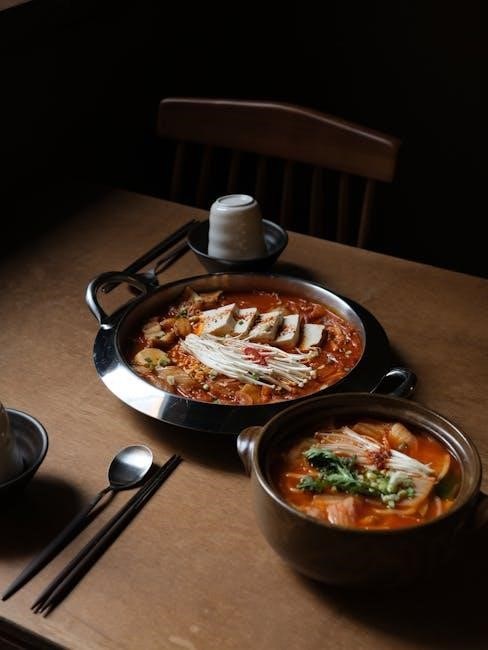
harringtons puppy food feeding guide
Harringtons Puppy Food is a trusted brand offering high-quality, natural ingredients tailored for puppies. Their recipes support growth and development with sustainable practices, ensuring optimal nutrition for young dogs.
Overview of Harringtons as a Brand
Harringtons is a trusted UK-based pet food brand, renowned for its commitment to natural ingredients and sustainable practices. Established with a focus on quality, Harringtons offers tailored nutrition for puppies, ensuring optimal growth and development. Their recipes are crafted with care, avoiding unnecessary additives, and prioritizing ethical sourcing; As the UK’s first carbon-neutral pet food company, Harringtons emphasizes eco-friendly production and transparency in their processes.
Product Range and Key Features
Harringtons offers a diverse range of puppy food options, including grain-free and standard formulas, tailored to meet the nutritional needs of growing puppies. Their recipes feature natural ingredients, smaller kibbles for easier digestion, and essential nutrients for healthy development. The brand emphasizes sustainable packaging and ethical sourcing, ensuring high-quality, eco-friendly products that cater to puppies of all sizes and sensitivities.

Understanding the Harringtons Puppy Food Feeding Guide
The Harringtons Puppy Food Feeding Guide provides tailored portions based on age, breed, and activity. It recommends adjusting meals as puppies grow and consulting a vet for precise amounts.
How to Read and Interpret the Feeding Chart
To interpret the Harringtons Puppy Food feeding chart, locate your puppy’s age and weight on the axes. The chart provides recommended daily portions, which should be divided by the number of meals per day. Adjustments may be needed based on growth stages, activity levels, or individual needs. Always consult a vet for personalized accuracy to ensure optimal nutrition for your puppy.
Adjusting Portions Based on Activity Levels
Puppies with higher activity levels may require up to 10-15% more food, while less active puppies may need slightly smaller portions. Monitor your puppy’s weight and adjust feeding amounts accordingly to prevent underfeeding or overfeeding. Always consult a veterinarian for personalized advice to ensure your puppy’s nutritional needs are met based on their energy expenditure and growth stage.

Nutritional Needs of Puppies
Puppies require a nutrient-rich diet with high-quality protein, vitamins, and minerals to support rapid growth and development. Harringtons Puppy Food provides balanced nutrition tailored to these needs.
Essential Nutrients for Growth and Development
Puppies need high-quality protein for muscle growth, calcium for strong bones, and DHA for brain development. Harringtons Puppy Food includes these nutrients, ensuring optimal growth and vitality. The recipes are enriched with vitamins and minerals to support energy levels and immune function. Additionally, antioxidants help protect against oxidative stress, while whole grains provide fiber for healthy digestion. This balanced approach supports overall development in puppies.
The Role of DHA in Cognitive Development
DHA, an Omega-3 fatty acid, plays a crucial role in puppies’ cognitive development by supporting brain growth and function. Harringtons Puppy Food includes DHA-rich ingredients to enhance memory, learning, and problem-solving skills. This nutrient is essential for neurological development, ensuring puppies grow into intelligent and mentally sharp dogs. By incorporating DHA, Harringtons helps lay the foundation for a lifetime of mental clarity and emotional stability.

Feeding Schedule Based on Age and Size
Harringtons provides a tailored feeding schedule based on puppies’ age and size. Adjust portions according to growth stages and activity levels for optimal nutrition. Their feeding chart offers guidance for precise daily amounts, ensuring balanced growth from puppyhood to adulthood.
Feeding Recommendations for Different Puppy Stages
Harringtons feeding guide provides tailored recommendations for puppies at different life stages, ensuring optimal nutrition. For younger puppies, smaller, more frequent meals are advised, while older puppies transition to fewer, larger portions. Adjustments are made based on breed size, with smaller breeds requiring more frequent feedings and larger breeds needing controlled portions to prevent rapid growth issues.
Adjusting Feedings for Small, Medium, and Large Breeds
Harringtons feeding guide recommends adjusting portions based on breed size. Small breeds need more frequent, smaller meals to prevent hypoglycemia, while large breeds require controlled portions to avoid joint strain. Medium breeds fall in between, with balanced feeding schedules. Consult the feeding chart and consider vet advice for personalized adjustments to ensure optimal growth and health for your puppy.

Transitioning from Puppy to Adult Food
Transitioning occurs when puppies reach adult age, typically around 12-18 months. Introduce adult food gradually over 7-10 days to prevent digestive upset, ensuring a smooth shift.
Signs Your Puppy is Ready for Adult Food
Your puppy is ready for adult food when they reach physical maturity, typically around 12-18 months. Look for steady weight gain, reduced growth spurts, and readiness for adult-sized kibble. A gradual transition prevents digestive upset, ensuring a smooth shift to adult nutrition while maintaining energy levels and overall health.
Gradual Transition Methods to Prevent Digestive Issues
Transition your puppy to adult food gradually to avoid digestive upset. Start by mixing a small portion of adult food with their puppy food, increasing the ratio over 7-10 days. Begin with 25% adult food and 75% puppy food, adjusting daily. Monitor for signs of discomfort and extend the transition if needed. Always consult your vet for personalized advice to ensure a smooth change.

Common Feeding Mistakes to Avoid
Overfeeding is a common mistake, leading to obesity and health issues like joint problems and heart disease. Stick to feeding charts to ensure proper portion sizes for healthy growth.
Overfeeding and the Risks of Obesity
Overfeeding is a common mistake that can lead to obesity in puppies, causing health issues such as joint problems and heart disease. Sticking to Harringtons’ feeding charts ensures proper portion sizes, promoting healthy growth. Excess weight can also strain a puppy’s developing body, so monitoring food intake is crucial. Regular weigh-ins and vet check-ups help maintain a balanced diet and prevent long-term health complications.
Neglecting Hydration Needs
Ensuring your puppy always has access to fresh water is crucial for digestion and overall health. Dehydration can quickly lead to serious issues, especially in growing puppies. Harringtons feeding guide emphasizes the importance of hydration alongside balanced nutrition. Always provide a clean water bowl, and consider adding a small amount of low-sodium chicken broth to encourage water intake, especially during weaning or transitions;

Role of Veterinarian Recommendations
Veterinarians play a crucial role in providing personalized feeding advice. They create tailored plans based on your puppy’s health, breed, and age, ensuring optimal nutrition and preventing health issues.
Importance of Personalized Feeding Advice
Personalized feeding advice ensures your puppy receives the right nutrients for their breed, size, and health status. Veterinarians consider factors like age, weight, and activity levels to create tailored plans, promoting optimal growth and preventing issues like obesity or nutrient deficiencies. Regular consultations and adjustments ensure your puppy thrives, making customized feeding recommendations indispensable for their long-term health and well-being.
Regular Check-Ups and Growth Monitoring
Regular veterinary check-ups are crucial for monitoring your puppy’s growth and ensuring they’re thriving on their feeding plan. These visits allow vets to assess weight, development, and overall health, making necessary adjustments to portion sizes or food types. Harringtons’ feeding guides and calculators provide a starting point, but professional guidance ensures personalized care, keeping your puppy at a healthy weight and preventing potential issues.

Importance of Portion Control
Portion control is essential to prevent overfeeding and support healthy growth. Using Harringtons’ feeding chart ensures accurate measurements, tailored to your puppy’s age, size, and activity level.
Using Measuring Cups for Accuracy
Accurate portion control is vital for your puppy’s health. Using measuring cups ensures you follow Harringtons’ feeding guide precisely, preventing overfeeding or underfeeding. Measure kibble carefully, as outlined, to meet your puppy’s nutritional needs. Consistency helps maintain a healthy weight and supports proper growth. Refer to the feeding chart for specific measurements tailored to your puppy’s age, size, and activity level.
Dividing Daily Rations into Multiple Meals
Dividing your puppy’s daily rations into multiple meals supports digestion and metabolism. Puppies thrive on smaller, frequent meals, reducing the risk of overeating. For example, feeding 3-4 times a day aligns with their natural grazing behavior. Adjust portions based on age, size, and activity, ensuring each meal is balanced and meets nutritional needs without overwhelming their system. This approach promotes steady growth and energy levels throughout the day.

Environmental Considerations in Feeding
Harringtons prioritizes eco-friendly practices, offering sustainable packaging and ethically sourced ingredients. Their carbon-neutral production ensures environmentally responsible pet food, aligning with modern green living standards for conscious pet owners.
Sustainable Packaging and Eco-Friendly Practices
Harringtons is committed to eco-friendly practices, using sustainable packaging to minimize environmental impact. As the UK’s first carbon-negative pet food company, they prioritize ethical sourcing of ingredients and environmentally responsible production methods, ensuring their puppy food aligns with eco-conscious values while maintaining high-quality nutrition for pets.
Ethical Sourcing of Ingredients
Harringtons prioritizes ethical sourcing, ensuring ingredients are responsibly procured to maintain high nutritional standards. Their commitment to sustainability includes using locally sourced, natural components and transparent supply chains. This approach supports both environmental integrity and the well-being of puppies, aligning with their reputation as a trusted, eco-conscious pet food brand.
Harringtons Puppy Food offers a balanced, nutritious diet with sustainable practices, ensuring optimal growth for puppies. Follow the feeding guide for a healthy, thriving companion.
Always follow the feeding chart on the packaging, adjusting portions based on your puppy’s age, size, and activity level. Monitor their weight and overall condition, ensuring they receive the right amount for healthy growth. Divide daily rations into multiple meals, especially for younger puppies, and consult a veterinarian for personalized advice to maintain optimal nutrition and prevent overfeeding.
Encouragement for Consistent and Informed Feeding Practices
Consistency in feeding is crucial for your puppy’s health and development. Stick to the recommended guidelines, use measuring cups for accuracy, and consult your veterinarian for tailored advice. Stay informed about your puppy’s needs and adjust feeding practices as they grow. By doing so, you ensure your puppy receives the right nutrition for a happy, healthy life.